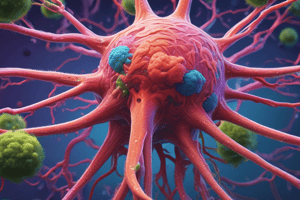Podcast
Questions and Answers
The lymphatic system is responsible for fighting off ______
The lymphatic system is responsible for fighting off ______
infections
Lymph contains many white blood cells such as monocytes, lymphocytes, dendritic cells, ______, and others
Lymph contains many white blood cells such as monocytes, lymphocytes, dendritic cells, ______, and others
macrophages
A key part of the lymphatic system is called ______
A key part of the lymphatic system is called ______
lymph
The lymphatic system's role centers around defense against bacteria entering through cuts, broken skin, etc., by removing them from the ______
The lymphatic system's role centers around defense against bacteria entering through cuts, broken skin, etc., by removing them from the ______
The lymphatic system traps germs at infection sites and carries them away to be destroyed by the body's protective ______
The lymphatic system traps germs at infection sites and carries them away to be destroyed by the body's protective ______
Lymphatic drainage helps keep you healthy by ensuring your immune system ______ properly
Lymphatic drainage helps keep you healthy by ensuring your immune system ______ properly
The lymphatic system helps in getting rid of waste products like lactic acid after ______.
The lymphatic system helps in getting rid of waste products like lactic acid after ______.
One waste product removed by the lymphatic system during activity is ______ dioxide.
One waste product removed by the lymphatic system during activity is ______ dioxide.
The lymphatic system acts as the first line of defense by assisting in immune responses to control ______.
The lymphatic system acts as the first line of defense by assisting in immune responses to control ______.
The immune system releases ______ that form a shield around damaged tissue in response to threats.
The immune system releases ______ that form a shield around damaged tissue in response to threats.
The lymphatic system helps in maintaining overall health by ensuring our internal ecosystem remains balanced and free from ______.
The lymphatic system helps in maintaining overall health by ensuring our internal ecosystem remains balanced and free from ______.
Without the lymphatic system, our lives would likely become much more difficult due to increased susceptibility to ______ and disorders.
Without the lymphatic system, our lives would likely become much more difficult due to increased susceptibility to ______ and disorders.
Flashcards are hidden until you start studying
Study Notes
Lymphatic System Overview
The lymphatic system is a complex network of tissues and organs that play essential roles in the human body. It's responsible for fighting off infections, flushing out waste, absorbing fats, transporting proteins, maintaining fluid balance within cells, preventing tissue swelling, and distributing white blood cells throughout our bodies. At its core is the concept of the lymphoid organ, designed specifically for the production of B-cells and T-cells—white blood cells that fight viruses and other foreign invaders. A key part of this system is called lymph, which is the clear liquid found inside the vessels of the lymphatic circulation system, made up mostly of plasma. It contains many white blood cells such as monocytes, lymphocytes, dendritic cells, macrophages, and others.
Functions of the Lymphatic System
One primary function of the lymphatic system is immunity. Its role centers around the defense against bacteria entering through cuts, broken skin, etc., by removing them from the bloodstream before they can cause harm to your body. When we come into contact with germs, the lymphatic system changes direction, rushes towards the infection site, traps whatever it comes across, and carries the bad stuff away to be destroyed by the body’s protective mechanisms. This process, known as lymphatic drainage, helps keep you healthy by ensuring your immune system works properly.
Another important job of the lymphatic system is getting rid of waste products like lactic acid after exercising. After strenuous exercise, these chemicals can build up in muscles and lead to fatigue if left there too long; however, because the lymphatic system clears them promptly, muscles recover quickly. Another waste product removed during activity is carbon dioxide, also cleared swiftly so as not to cause gas and bloating in your stomach. Since it does all this work while remaining unseen, most people don't even know what their lymphatic systems do for them until something goes wrong!
Immune Response
Imagine your lymphatic system as a security guard patrolling an airport terminal, looking for potential threats. If someone tries to sneak past, the guard will raise an alarm and alert authorities. Similarly, when the immune system senses a threat (like a virus), it releases antibodies that form a shield around the damaged tissue, keeping any further damage contained. Once the intruder is identified and captured, the immune system destroys and removes it from the body so it cannot infect anyone else. In this sense, the lymphatic system acts as the first line of defense, helping maintain good health by controlling disease.
In summary, the lymphatic system plays a critical role in maintaining overall health and wellbeing. By carrying out various tasks including immune responses, it ensures that our internal ecosystem remains balanced and free from illnesses. Without it, our lives would likely become much more difficult due to increased susceptibility to diseases and disorders.
Studying That Suits You
Use AI to generate personalized quizzes and flashcards to suit your learning preferences.




